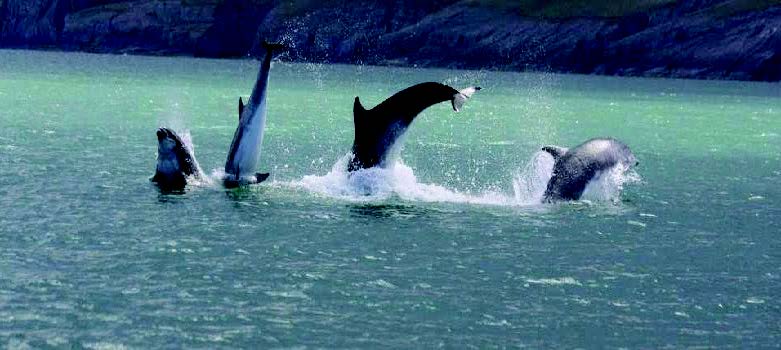News
Controversy over scallop dredgers

 A PETITION aiming to stop scallop dredging grounds from being extended in Cardigan Bay has received over 15,000 signatures, following criticism of a Welsh Government consultation. However, fishermen who have seen a lucrative ground closed for what will be at least seven years have claimed that extensive scientific studies carried out on the grounds since 2010 indicate that there is room for a sustainable fishery. The SAC (Special Area of Conservation) in Cardigan Bay is a traditional scallop fishery, which was closed in 2009 following concerns about the environmental impact of an influx of boats.
A PETITION aiming to stop scallop dredging grounds from being extended in Cardigan Bay has received over 15,000 signatures, following criticism of a Welsh Government consultation. However, fishermen who have seen a lucrative ground closed for what will be at least seven years have claimed that extensive scientific studies carried out on the grounds since 2010 indicate that there is room for a sustainable fishery. The SAC (Special Area of Conservation) in Cardigan Bay is a traditional scallop fishery, which was closed in 2009 following concerns about the environmental impact of an influx of boats.
A small area of Cardigan Bay – The ‘Kaiser Box’ is opened for fishing during the scallop season (Nov – Apr). This has been overfished, to the extent where some local boats are fishing alternative locations or for different catches. It is also claimed, both anecdotally and by scientists involved with the ‘test fishing’ that scallop stocks outside of the Kaiser Box are thriving to the extent where they are potentially unable to reach full growth and are leading to a reduction in biodiversity. The Welsh Government proposes to introduce a ‘managed fishery’ where areas of Cardigan Bay between three and 12 miles out to sea would be fished, with limits imposed on the number of times per season that each patch is dredged, restrictions on equipment used, and flexible restrictions based on the results of regular monitoring. A consultation was launched in November, but relaunched following criticism of the clarity of an online version, and a technical error. This area of Cardigan Bay was said by the Welsh Government to be mostly shallow water where the sand sea-bed was susceptible to ‘wave shaping’.
Test fishing carried out by scientists from Bangor University among others showed that, in the words of the Welsh Government report: ‘This experiment concluded that, as scallop intensity increased, the negative effects on the animal community also increased such that the abundance (i.e. number) and biomass (i.e. weight) of organisms per unit area of the seabed declined. ‘However, these effects were relatively minor and short – lived and were reversed in the period between May and September in the same year (note this would also coincide with the closed season for some scallop fisheries).
‘Depending on the sediment type, the abundance and biomass of benthic species (particularly the prey for fish) had increased in areas with the highest scallop dredging intensity. This may have occurred due to the removal of scallops which constitute the dominant fauna (in biomass) within the areas studied – i.e. through the removal of the main competitor for food. ‘Thus the effects of scallop dredging on prey species for fish do not appear to be a cause for concern. For most areas of the seabed, the physical effects of scallop dredging were no longer present 12 months later. There were two exceptions to this – one more cobbly area of seabed close to the 3 nautical mile zone that had been fished with an intensity of between 3 and 4 times fished, and one area in the 6-12 nautical mile zone that had been fished slightly more than 6 times (these figures are derived from averaging the fishing intensity across the experimental fishing area). Now that the location of these areas has been identified, the Welsh Government will be in a position to protect them by way of spatial restrictions’.
However, environmental writer George Monbiot rubbished these claims. In an ‘emotive’ article, entitled The Dolphin Killers of Cardigan Bay, which appeared in the Guardian last month as an opinion piece, Mr Monbiot made the claim that because the sea beds in Cardigan Bay had been dredged and trawled for years, they were likely to take ‘decades if not centuries’ to recover their former biodiversity, and as such, the Bangor University Study was flawed. One scientist was quoted as suggesting that if you failed to mow your lawn for five years, you would not end up with a first-growth oak forest. While this is true, it does seem to be a somewhat trite statement in this context. Mr Monbiot made some very valid points.
The effects of beam trawling and dredging on certain sea beds, especially coral and reefs, is devastating, and these are widely regarded as two of the more destructive forms of fishing in terms of environmental impact. However, claims about the damage to cuter varieties of marine fauna were not sufficiently explained. However, ‘The people who may be interfering with the Dolphins’ food chain in Cardigan Bay’ lacks the same impact as a headline. This article was linked to the Change.org petition. This also begs the question of where these dolphins were when the grounds were being fished before. Because this is an emotive subject, no fishermen were willing to be interviewed on the record, but no one The Herald talked to had noticed an increase or decrease in the number of dolphins and porpoises in Cardigan Bay over the last decade.
Whether Mr Monbiot had data illustrating this or not is open to question, but one would think that data which proved the main hypothesis of the article would have been reproduced, or footnoted. A number of fishermen expressed their frustrations that following one of the most detailed assessments into the impact of scallop fishing, that a consultation based on this has been extended. The Herald was told that it was in the interests of fishermen to work within any Government-imposed restrictions, both to continue fishing, and to make sure that the industry was sustainable. Many of those commenting on the petition seemed to imply that eco tourism or alternative fishing methods could replace the dredging industry, or such of it as remains. To some extent the latter has occurred naturally in this area; notably fewer scallop boats have been seen in Milford Docks, for example, this winter, at least partly as a result of poor catches in the permitted area.
The overlap between commercial fishing and eco-tourism probably looks a lot clearer from the perspective of a holidaymaker, though it is hard to see how many transferable skills there would be between the two, and while diving for scallops may be the preferred method, the yields using this method equate to a small percentage of the total scallop catch, thought to be worth between £5 and 6mfrom Cardigan Bay alone. To respond to the relaunched Welsh Government consultation, visit: http://gov.wales/consultations/ e n v i r o n m e n t a n d c o u n t r y s i d e / p r o p o s e d – n e w – m a n a g e m e n t – measures-for-the-scallop-fisheryin- cardigan-bay/?lang=en To sign the change.org petition, visit their website and search for Cardigan Bay.
Charity
Vincent Davies raises £13,682 for air ambulance charity

Independent Haverfordwest store backs lifesaving crews with year of community fundraising
A WEST WALES department store has raised more than thirteen thousand pounds for a lifesaving emergency service after a packed year of community fundraising.
Staff at Vincent Davies Department Store collected £13,682 for the Wales Air Ambulance Charity, after voting the organisation their Charity of the Year for 2025.
The independent retailer organised events throughout the year, including an Easter bingo, bake sales, quizzes, raffles, staff sales, Christmas jumper days and a festive wreath-making workshop. Charity jam jars placed in Café Vincent also helped gather steady donations from customers.
One of the most popular attractions was the store’s charity singing penguin trio, which drew smiles from shoppers of all ages and boosted collections.
Sarah John, Joint Managing Director at Vincent Davies, said: “Raising £13,682 for the Wales Air Ambulance Charity is something we are extremely proud of at Vincent Davies Department Store. As a director, it’s wonderful to see our community come together to support a charity that makes such a lifesaving difference.”
The air ambulance is consultant-led, delivering hospital-level treatment directly at the scene of serious incidents and, when needed, transferring patients straight to the most appropriate specialist hospital.
Working in partnership with the NHS through the Emergency Medical Retrieval and Transfer Service, crews can provide advanced critical care including anaesthesia, blood transfusions and even minor surgical procedures before reaching hospital.
Operating across the whole of Wales, its teams travel the length and breadth of the country by helicopter and rapid response vehicle to reach patients quickly in both rural and urban areas.
This is not the first time the Haverfordwest store has backed the cause. In 2016, staff previously raised £5,831 when the charity was also chosen as their beneficiary.
Mike May, the charity’s West Wales Regional Fundraising Manager, said: “We are so grateful to Vincent Davies Department Store for raising an incredible amount for our charity. Throughout the year they put on a variety of different events and what a successful fundraising year it was.
“The charity needs to raise £13 million every year to keep our helicopters in the air and our rapid response vehicles on the road. By raising £13,682, the staff and customers have played an important part in saving lives across Wales.”
The store says it will announce its Charity of the Year for 2026 in the coming weeks.
Crime
Police assess complaints over Mandelson–Epstein links

Met says allegations will be reviewed to see if criminal threshold is met following release of US court files
SCOTLAND YARD is reviewing a series of complaints alleging possible misconduct in public office after fresh claims emerged linking former UK ambassador Peter Mandelson to convicted sex offender Jeffrey Epstein.
The Metropolitan Police Service confirmed it has received “a number of reports” following the publication of millions of pages of material by the United States Department of Justice, and will now decide whether any alleged conduct reaches the level required for a criminal investigation.
Commander Ella Marriott said the force would assess each report individually, stressing that a review does not automatically lead to formal proceedings.
The documents, widely referred to as the “Epstein files”, appear to show Mandelson corresponding with Epstein while serving as business secretary during the government of Gordon Brown at the height of the global financial crisis.
According to reports, Epstein was allegedly given insight into internal policy discussions, including proposals around banker bonus taxes in 2009 and details of a eurozone bailout package shortly before it was announced publicly.
Payments questioned
Bank records cited in the US disclosure reportedly show payments totalling 75,000 US dollars made to Mandelson between 2003 and 2004. It is also claimed Epstein paid for an osteopathy course for Mandelson’s husband.
Mandelson has denied any wrongdoing and said he has “no record or recollection” of the alleged transfers.
On Sunday he resigned his membership of the Labour Party, saying he did not want his continued association to cause further difficulty for the party.
In interviews, he dismissed suggestions that Epstein influenced his decisions as a minister and said nothing in the released files pointed to criminality or misconduct on his part.
Pressure mounts
The political fallout has intensified, with Downing Street confirming Keir Starmer has asked Cabinet Secretary Chris Wormald to carry out an urgent review into Mandelson’s historic contacts with Epstein while in office.
Brown has also called for an examination of whether any confidential or market-sensitive information was improperly shared during the financial crisis.
The case is the latest in a series of controversies linked to Epstein’s long-standing relationships with powerful figures on both sides of the Atlantic.
Police emphasised that no charges have been brought and that Mandelson is not currently under criminal investigation, but said the complaints process would be handled “thoroughly and impartially”.
Community
Councillor meets chief constable to address Monkton and Pembroke concerns

COUNTY COUNCILLOR Jonathan Grimes has met with the new Chief Constable of Dyfed-Powys Police to discuss crime, antisocial behaviour and wider community issues affecting residents in Pembroke and Monkton.
Cllr Grimes, who represents Pembroke St Mary South and Monkton, said the meeting followed his invitation for senior police leaders to visit the area and hear first-hand about local concerns.
The Chief Constable, Ifan Charles, attended alongside officers from the Pembroke Neighbourhood Policing and Protection Team, meeting the councillor in Monkton for what were described as open and constructive talks.
As part of the visit, they also spoke with Monkton Priory Community Primary School headteacher Dylan Lawrence and Danny Nash from Pembrokeshire County Council Housing Services to gather views from education and housing professionals.
Discussions covered a range of issues raised by residents, including domestic abuse, drug and alcohol misuse, antisocial behaviour and environmental concerns such as littering, dog fouling and dangerous or inconsiderate driving.
Cllr Grimes acknowledged recent police successes, particularly in tackling drug-related activity, but said enforcement alone would not solve the area’s challenges.
He said closer cooperation between the police, council services, schools and the wider community would be needed to deliver longer-term improvements.
The councillor added that he plans to encourage residents to form a local community group in the coming weeks, aimed at developing practical solutions and strengthening partnership working across the area.
-

 Health4 days ago
Health4 days agoConsultation reveals lack of public trust in health board
-

 News6 days ago
News6 days agoCaldey still unsafe, survivors warn — despite Abbey’s reform claims
-

 Community5 days ago
Community5 days agoPembrokeshire students speak at national Holocaust Memorial Day event
-

 News6 days ago
News6 days agoKurtz raises Gumfreston flooding in the Senedd as petition deadline nears
-

 Entertainment6 days ago
Entertainment6 days agoRapunzel brings festive magic to Torch Theatre
-

 Crime6 days ago
Crime6 days agoMan denies murdering brother as jury hears of ‘ferocious attack’ at Morriston flat
-

 Community7 days ago
Community7 days agoStorm Chandra: Morning impacts across Pembrokeshire
-

 Education5 days ago
Education5 days ago‘Vulnerable teen’ questioned by police at Milford Haven School

























